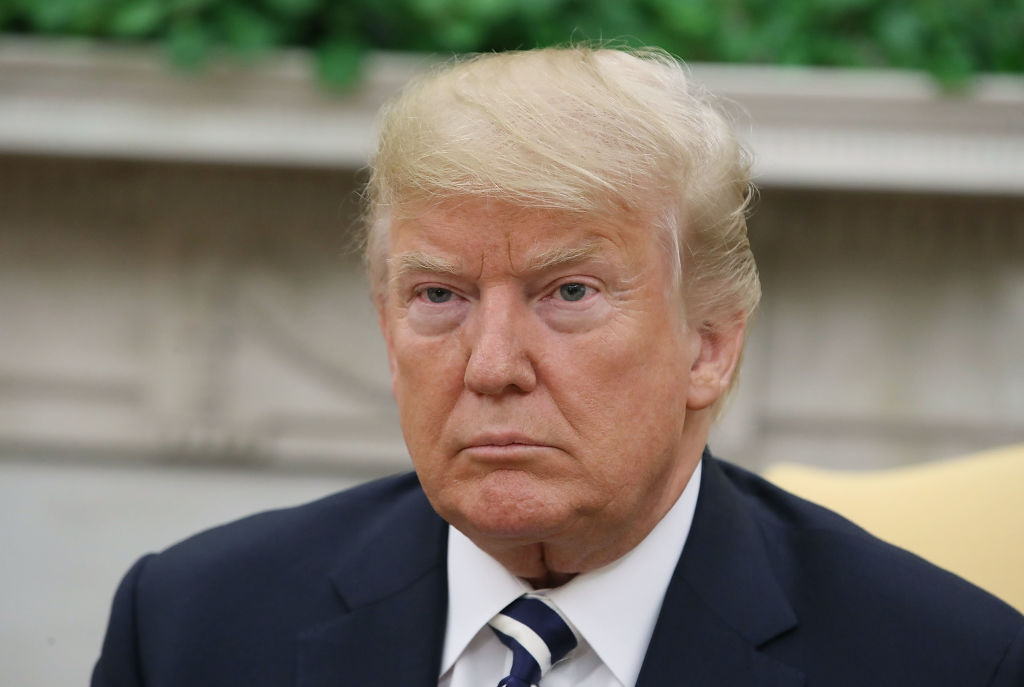I watched a video the other day of a man who, although obviously very frightened indeed by the idea of flying through the air in an aeroplane, had for some reason decided to fly through the air in an aeroplane. Perhaps he’d been persuaded to by friends. Perhaps someone had told him the only way to overcome a fear is to confront it. Anyway, the video – recorded by a fellow passenger – showed him mid-flight convulsed by paroxysms of mortal fear, screaming “I’m going to die, I’m going to die” as attendants set about trying to restrain him. He wanted very badly to get off that plane.
I think of this man, sympathetically, whenever I hear perfectly sensible people say seriously they think President Trump is going to bring about the end of the world. Their fear is genuine and they live with it. Rightly or wrongly, they think Trump is unstable or insane and that he’s got the nuclear codes and that one day soon, because of him, we will all be visited by apocalypse and that in the nanoseconds before we are vaporised the very sky will be lit with such brilliance that our clothes and our skin will become instantaneously transparent – indeed, that our last sight will be of the people around us, perhaps our loved ones, transformed into terrified screaming skeletons.
In the US, clinical psychologists are reporting a spike in the incidence of politics-related stress among their patients. Already the term “Trump Anxiety Disorder”, coined by psychologist Jennifer Panning, is being bandied about by mental healthcare professionals. Apparently TAD can be distinguished from general anxiety disorders because the symptoms it presents are “specific to the election of Trump and the resultant unpredictable sociopolitical climate.” It is thought the condition – which, according to Panning, causes those gripped by it to worry intensely about “what’s next” and to spend excessive time on social media – goes some way to accounting for an overall national rise in reports of stress observed by the American Psychological Association.
It’s easy to understand why people might be worried. None of us wants to die. Perhaps TAD is really just a reprise of the generational unease felt during the two or so decades either side of the Cuban Missile Crisis when the US and the USSR were embarked on a terrifying nuclear arms race. Since the 1990s, however, despite the continued existence of the missiles – sufficient to destroy the world many times over – their dread power over the collective unconscious seemed to have dissipated. Millennials, for example, do not typically place the prospect of nuclear annihilation high on their often comprehensive lists of grievances with the world. By comparison, some of the greatest minds from the previous generation, for example Jordan Peterson, Christopher Hitchens and Martin Amis, have said they spent most of the 1980s profoundly concerned by the horribly real-seeming prospect of mutually assured destruction.
That in recent decades we became less frightened of nuclear armageddon was surely one of the great victories of post-Cold War globalisation – a sense that we’re all in it together and that everything would be solved by market forces. Why nuke each other when there’s Coca Cola to be drunk and flat-screen televisions to be watched?
No more. Trump made clear in his American Carnage inauguration speech that things were going to change, seismically, and no one can say he hasn’t been true to his word. If you’re a fan of his, then what has occurred since January 20, 2017 – the setting of the world order on its head – has been a profoundly thrilling experience. But if you’re not a fan – if you think Trump is completely reckless – terror seems an entirely logical reaction.
Without a keen innate sense of yeehah, for example, how should a normal person respond to communications sent by the most powerful man in the world such as the tweet he posted in early November: “Russia vows to shoot down any and all missiles fired at Syria. Get ready Russia, because they will be coming, nice and new and smart! You shouldn’t be partners with a Gas Killing Animal who kills his people and enjoys it!”
Or the one he sent last week to Iran’s President Rouhani: “NEVER, EVER THREATEN THE UNITED STATES AGAIN OR YOU WILL SUFFER CONSEQUENCES THE LIKES OF WHICH FEW THROUGHOUT HISTORY HAVE SUFFERED BEFORE. WE ARE NO LONGER A COUNTRY THAT WILL STAND FOR YOUR DEMENTED WORDS OF VIOLENCE & DEATH. BE CAUTIOUS!”
Or the famous verbal warning to North Korea leader Kim Jong-un that his country would be “met with fire and fury like the world has never seen” should he continue to vex America.
Clinical psychologist Elisabeth Lamotte recently told CBC “whether it’s conscious or not, I think we look to the president of the United States as a psychological parent.” But it doesn’t take a psychologist to tell you the children of aggressive fathers often turn out cowed and depressed. It’s no wonder Trump’s divisive leadership style is causing widespread anxiety among the populace.
There was a revealing moment in Piers Morgan’s Davos interview with Trump when Morgan told him: “Depending on who you talk to, you’re either delivering on a lot of your promises, beginning to make America great as you vowed, or you’re a raging, tweeting wrecking ball who’s destroying the country and terrifying the entire planet.” Without missing a beat, Trump replied: “I shake things up. It had to be shaken up. The country had to be shaken up.”
The problem, of course, with shaking things up is it doesn’t take much for people to lose their fundamental sense of equilibrium. The man I watched on the aeroplane was shaken up in an extreme sense but even in the darkest recesses of his terror he might have known that should he survive his ordeal he need never go on an aeroplane again. The problem now for Americans, and indeed for all Earthlings, is that there’s no getting off. There’s nowhere else to go. The man in charge of the planet seems unafraid to open geopolitical negotiation by demonstrating willingness to begin down the road signposted “thermonuclear war”. Is he bluffing? He must be. It’s how he thinks he will Make America Great Again. The danger is he’ll succeed only in making America a basket case. Hold tight.





















